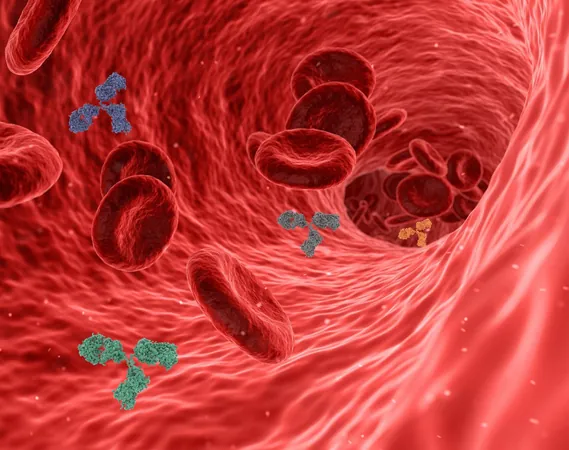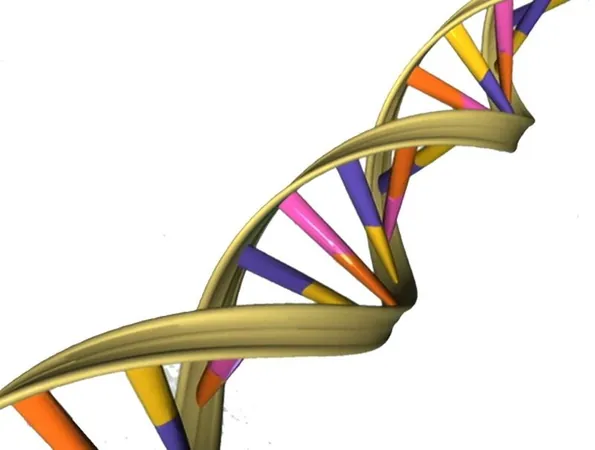
Shocking Discovery: How Alcohol Ruins Your Liver's Healing Power!
2025-09-11
Author: Mei
Alcohol's Surprising Impact on Liver Regeneration
Researchers from the University of Illinois Urbana-Champaign, alongside teams from Duke University and the Chan Zuckerberg Biohub Chicago, have unveiled alarming findings about the effects of excessive alcohol consumption on the liver’s regenerative abilities. Even after individuals stop drinking, their liver cells can become trapped in a state that hinders healing, revealing new avenues for potential treatments.
The Deadly Reality of Alcohol-Associated Liver Disease
The liver is known for its remarkable capacity to regenerate after damage, but this ability diminishes significantly in patients suffering from alcohol-associated liver disease—the leading cause of liver-related deaths globally, claiming approximately 3 million lives each year. Professor Auinash Kalsotra, who co-led the study, expressed the urgent need to understand why liver function ceases in patients, even after they quit drinking. Currently, liver transplantation is often the only viable treatment for those experiencing liver failure.
How Inflammation Stalls Recovery
Over years of investigation, Kalsotra and his colleagues found that liver cells typically revert to a more youthful, regenerative state to heal. However, they noted a frustrating roadblock in patients with alcohol-related conditions, as observed through samples obtained from Johns Hopkins University Hospital. Damaged liver cells could initiate the regenerative process but then stalled in an unproductive, ‘quasi-progenitor’ state.
The Science Behind the Stagnation
In a groundbreaking approach, the researchers delved deeply into RNA splicing—the essential process that determines how proteins are created from genetic instructions. Instead of just measuring overall RNA or protein levels, they focused on how RNAs were assembled. The findings were shocking: over a thousand genes showed mis-splicing in alcohol-affected livers, significantly hindering protein function, which is crucial for proper liver regeneration.
The Missing Protein: ESRP2
A key insight from the research pointed to a protein called ESRP2, which is critical for correct RNA splicing. Liver cells affected by alcohol damage displayed a marked deficiency of ESRP2. This deficiency means that even though there’s plenty of RNA and protein present, they are not in the right places to function properly—crucial proteins intended for liver repair got stuck in the wrong parts of the cell.
Potential Solutions Await!
To confirm the role of ESRP2 in liver damage, the research team experimented with genetically altered mice lacking the ESRP2 gene, mirroring the liver damage seen in humans with advanced alcohol-related conditions. Alarmingly, they discovered that inflammatory and growth factors released by liver and immune cells during alcohol processing suppressed ESRP2's production. In laboratory tests, when these inflammatory factors were inhibited, ESRP2 levels bounced back, correcting the splicing issues.
A Hopeful Future for Treatment
Professor Kalsotra is optimistic that these insights could pave the way for innovative clinical therapies. By identifying mis-spliced RNAs as potential diagnostic markers and targeting inflammation pathways, there is a tantalizing possibility that correcting splicing errors could lead to significant recovery and restoration of liver health. "This could revolutionize how we approach treatment for alcohol-related liver disease," Kalsotra stated.





 Brasil (PT)
Brasil (PT)
 Canada (EN)
Canada (EN)
 Chile (ES)
Chile (ES)
 Česko (CS)
Česko (CS)
 대한민국 (KO)
대한민국 (KO)
 España (ES)
España (ES)
 France (FR)
France (FR)
 Hong Kong (EN)
Hong Kong (EN)
 Italia (IT)
Italia (IT)
 日本 (JA)
日本 (JA)
 Magyarország (HU)
Magyarország (HU)
 Norge (NO)
Norge (NO)
 Polska (PL)
Polska (PL)
 Schweiz (DE)
Schweiz (DE)
 Singapore (EN)
Singapore (EN)
 Sverige (SV)
Sverige (SV)
 Suomi (FI)
Suomi (FI)
 Türkiye (TR)
Türkiye (TR)
 الإمارات العربية المتحدة (AR)
الإمارات العربية المتحدة (AR)